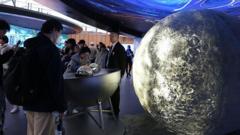Amid heightened trade tensions, China is allowing researchers from six countries, including the U.S., to analyze moon rocks collected during its 2020 Chang'e-5 mission, providing an opportunity for scientific collaboration across borders.
China Offers Access to Moon Samples for U.S. Scientists Amid Ongoing Trade Tensions

China Offers Access to Moon Samples for U.S. Scientists Amid Ongoing Trade Tensions
China opens its lunar treasures to global scientists, including U.S. institutions, despite a contentious trade relationship.
Chinese authorities have made a significant move by granting American scientists access to rare moon rocks, a gesture that highlights the importance of international scientific collaboration even in times of political discord. The China National Space Administration (CNSA) announced that two prominent U.S. institutions will be involved in the examination of samples gathered during the Chang'e-5 lunar mission.
CNSA chief Shan Zhongde emphasized that these samples are "a shared treasure for all humanity." This development is particularly notable as it comes against the backdrop of ongoing trade conflicts between China and the United States, where tariffs on goods have reached staggering rates—up to 245% imposed by Washington on Chinese imports, while Beijing retaliates with 125% tariffs on U.S. products.
U.S. institutions Brown University and Stony Brook University are among the select few scientists to study the lunar samples, which are believed to be a billion years younger than those retrieved during the Apollo missions. This finding could suggest that volcanic activity on the moon persisted longer than previously understood.
John Logsdon, a former director at the Space Policy Institute, commented that the exchange of lunar rock samples transcends political issues and enters the realm of shared scientific inquiry. Despite U.S. restrictions limiting NASA's engagement with China under a 2011 law, he emphasized that allowing scientists to work together on moon samples contains no military implications and is effectively a continuation of international cooperation norms.
In the past year, U.S. and Chinese space officials attempted to negotiate a broader exchange of moon samples, but those talks did not culminate in an agreement. The CNSA's latest initiative marks a pivotal moment, as Shan noted a commitment to promoting open international cooperation in space exploration, stating, "I believe China's circle of friends in space will continue to grow."



















